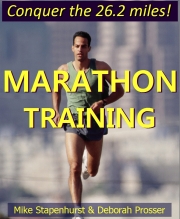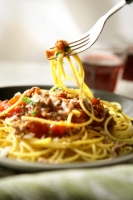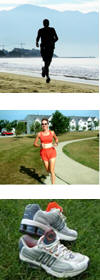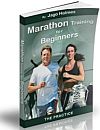| ||||||||||||||||||||||||
|
|
What to eat I think we are all aware of the importance of eating fresh produce, and getting the right combination of protein, grains and fruit and vegetables. Salads and raw vegetables are especially beneficial because they have not lost any nutrients due to cooking. Fish and chicken are better than red meat. Whey and soy products are a good substitute for animal protein. For the non-vegetarian eaters, I recommend having a ‘vegetarian’ day at least once a week. Your goal as a runner is to make sure you eat the best combination of foods to maintain a healthy body.
What not to eat All the bad things you hear about fast foods are true! They shouldn’t be part of your marathon training diet. The amount of saturated fat and low quality carbohydrates in fast foods will not help your training, and in excess will be detrimental to your overall health. When I line up for my morning coffee it’s easy to spot the people who have had too many donuts for breakfast over the years! Frozen meals as well have lost a lot of their nutritional value due to the preparation process. Ever notice the sorry-looking broccoli you find in some of the ‘dinner’ plates? Finally those two standbys, coffee and alcohol, should only be consumed in moderation.
High carbs, low carbs, no carbs? Complex carbohydrate intake from grains and pasta has long been recommended as the foundation of a running diet. This of course contradicts the dietary counsel of anyone trying to lose or maintain weight. Since these articles are focused on marathon training we have to look at your needs during the weeks leading up to the marathon. This could well be different from your normal diet. You definitely need to make sure you eat sufficient carbohydrates to help provide the energy you need on longer runs.
How much is enough? When I’m not marathon training I prefer a lower carbohydrate based diet. You need to assess the intensity of your own training. If you are looking to run a faster marathon and have high weekly mileage you need to have a fairly high carb intake. My recommendations in terms of percentage of your calorie intake are as follows:
Of course this could vary a lot, depending on serving sizes. Usually though we often end up eating too much animal protein, which can be hard on your system if you overdo it. The amount you need depends on several factors including weight, and gender. Use our online calculator to get an idea of your marathon training nutrition requirement.
The vegetarian runner If you are in this group you already know the many health benefits of a vegetarian diet. When you are marathon training just make sure you are getting the carbohydrates you need, and also sufficient protein.
Carbo’ loading vs. the Zone Except during marathon training, I am a strong believer in the Zone diet also known as 40-30-30. I highly recommend you read one of Barry Sears’ books about the zone. Briefly said, we should be getting our calories in the following proportions:
When I first picked up a copy of Sears’ book the thing that grabbed my attention right away was the fact that the women’s US Swim team had followed his eating regime, and scored an unprecedented success in the Olympics.
Another advantage of this diet in conjunction with endurance training is that your body will get some of its energy from fat on a regular basis. The body’s switchover from burning calories from carbohydrates to fat is going to happen in the marathon anyway, and is one cause of “hitting the wall”. On the zone diet your body gets more used to this, and will reduce the impact when you are actually running the marathon.
Alternate Fast Foods Given the fast pace of modern life, we often don’t have the time to prepare full meals. Here are a few alternates to the burger choice:
Ø Chicken Caesar makes a quick nutritious meal, add some carbohydrate. Ø Nuts make great snacks and are packed with nutrients and vitamins Ø Bananas make a simple snack and also contain potassium Ø Soups like lentil soup have a lot of nutritional value and are also very filling!
Fruit and vegetables Fruit and vegetables are full of vitamins and nutrients and are a great nutritional source
that will contribute to your well-being. Since I started to watch my diet more carefully, and increased my intake of these foods I have seen many benefits. I have more energy and vitality; I don’t get that afternoon tired feeling, and generally feel more positive about things.
Juicing We bought a juicing machine several years ago, and I am convinced this is a great way to get all the benefits from vegetables, without having to eat huge servings. We enjoy a carrot and apple juice combination most mornings. Since the vegetables are juiced raw, you don’t lose nutrients either. If you are in a hurry this is also a quick complement to a light meal. There are many books available on this topic if you are interested.
Water We’ve all heard of the 8 glasses a day rule, but how many of us actually do it? The benefits of drinking lots of water are well known. Being properly hydrated will replenish the fluid lost through sweating and help you run faster.
Vitamin supplements If you ate a good diet all the time you probably wouldn’t need any supplements like vitamin “C” or “E”. My take on this is that some supplements can be very beneficial and are worth the cost. I usually take vitamins B, C and E about four times a week. For men, Saw Palmetto extract is supposed to help guard against prostate problems. For those of us over 50, calcium supplements in moderation are good for guarding against osteoporosis.
Fish Oil Remember your grandmother telling you to take your teaspoonful of cod liver oil. Well there are plenty of studies showing the benefits of a regular intake of fish oil. These include:
You can get these in capsule form for easy ingestion.
Benefits of a ‘good’ diet We all have different opinions about what to eat, so ultimately it’s your choice! I believe following basic principles like…
…will make you feel better, and will help to keep you in shape for your marathon.
| |||||||||||||||||||||||






 Beginner
Marathoners!
Beginner
Marathoners!